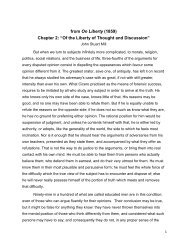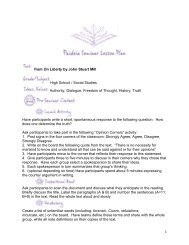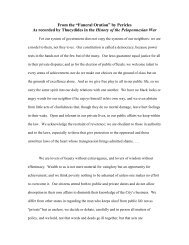Rousseau_contrat-social
Create successful ePaper yourself
Turn your PDF publications into a flip-book with our unique Google optimized e-Paper software.
nature gives each man absolute power over all his members, the <strong>social</strong><br />
compact gives the body politic absolute power over all its members also;<br />
and it is this power which, under the direction of the general will,<br />
bears, as I have said, the name of Sovereignty.<br />
But, besides the public person, we have to consider the private persons<br />
composing it, whose life and liberty are naturally independent of it. We<br />
are bound then to distinguish clearly between the respective rights of<br />
the citizens and the Sovereign,[9] and between the duties the former<br />
have to fulfil as subjects, and the natural rights they should enjoy as<br />
men.<br />
Each man alienates, I admit, by the <strong>social</strong> compact, only such part of<br />
his powers, goods and liberty as it is important for the community to<br />
control; but it must also be granted that the Sovereign is sole judge of<br />
what is important.<br />
Every service a citizen can render the State he ought to render as soon<br />
as the Sovereign demands it; but the Sovereign, for its part, cannot<br />
impose upon its subjects any fetters that are useless to the community,<br />
nor can it even wish to do so; for no more by the law of reason than by<br />
the law of nature can anything occur without a cause.<br />
The undertakings which bind us to the <strong>social</strong> body are obligatory only<br />
because they are mutual; and their nature is such that in fulfilling<br />
them we cannot work for others without working for ourselves. Why is it<br />
that the general will is always in the right, and that all continually<br />
will the happiness of each one, unless it is because there is not a man<br />
who does not think of "each" as meaning him, and consider himself in<br />
voting for all? This proves that equality of rights and the idea of<br />
justice which such equality creates originate in the preference each man<br />
gives to himself, and accordingly in the very nature of man. It proves<br />
that the general will, to be really such, must be general in its object<br />
as well as its essence; that it must both come from all and apply to<br />
all; and that it loses its natural rectitude when it is directed to some<br />
particular and determinate object, because in such a case we are judging<br />
of something foreign to us, and have no true principle of equity to<br />
22











